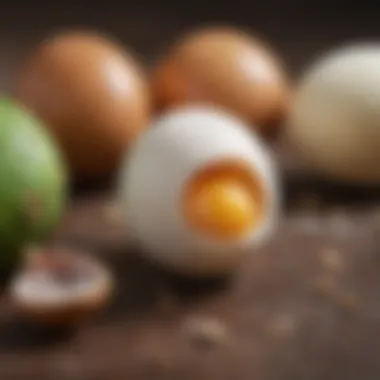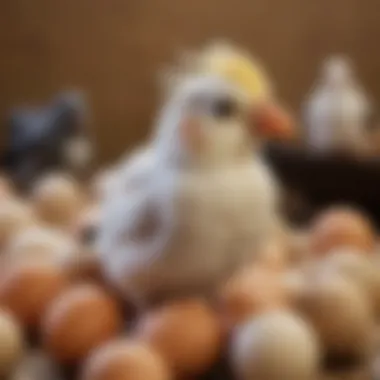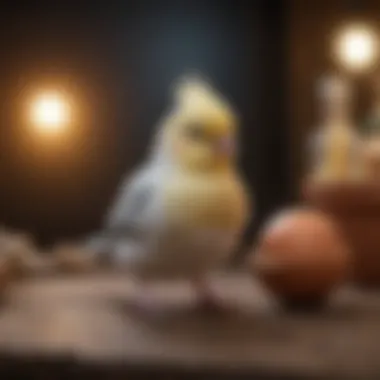Comprehensive Guide to Cockatiel Egg Food Nutrition


Intro
When considering the best nutrition for cockatiels, understanding their specific dietary needs is fundamental. This includes knowledge about the importance of egg food, especially for breeding and non-breeding birds. Nutritional requirements differ based on various factors including age, activity level, and health status.
Providing the right nutrients can significantly influence the wellbeing of your pet cockatiel. This guide serves as a detailed resource on cockatiel egg food, aiming to equip bird owners with essential insights into the type of nutrition their birds require. It will delve into the composition of egg food, its relevance in a cockatiel's diet, and practical methods to integrate it into their daily meals.
Understanding Your Pet
Pet Behavior Basics
Cockatiels, as social and intelligent birds, exhibit a range of behaviors that reflect their emotional and physical needs. Understanding these behaviors is crucial for effective care. They thrive on interaction and can exhibit signs of boredom or stress if not engaged sufficiently. This engagement can influence their willingness to eat nutritious foods, including egg food.
Common Breed Characteristics
Cockatiels, typically characterized by their vibrant yellow and orange cheeks, display unique traits that define their species. These birds are known for their friendly disposition and tend to bond closely with their humans. They can become accustomed to routines, and any changes in this routine can cause anxiety. It is essential for pet owners to be aware of these factors when introducing new foods like egg food to their diet.
Species-Specific Needs
As with any pet, cockatiels have specific dietary requirements. They need a balanced intake of proteins, carbohydrates, vitamins, and minerals. Egg food is particularly rich in protein and plays a crucial role during breeding periods, aiding in egg development and the health of hatchlings. When not breeding, egg food can still supplement a cockatiel's diet, ensuring they receive essential nutrients.
Pet Care and Maintenance
Feeding Guidelines
Feeding your cockatiel a varied and balanced diet is vital. Egg food should not be the only dietary element; it must complement other food sources such as high-quality seeds, pellets, fresh fruits, and vegetables. A recommended feeding ratio involves offering egg food a few times a week alongside a consistent daily diet. This approach ensures your cockatiel receives a well-rounded nutritional profile.
Grooming Essentials
Grooming plays an important role in your cockatiel's overall health. Regularly checking and trimming their nails is necessary. Clean and healthy feathers also promote better digestion and comfort, allowing your bird to consume food without obstacles.
Hygiene Practices
Maintaining clean living conditions is equally important. Regularly change the cage liner, clean feeding dishes, and inspect water sources to avoid contamination. These simple practices contribute to your cockatiel’s overall health and encourage a healthy appetite.
Training and Development
Basic Commands and Skills
Training your cockatiel is not just about discipline; it strengthens the bond between the pet and owner. Teaching basic commands such as
Preamble to Cockatiel Diets
Understanding the diets of cockatiels is crucial for their optimal growth, health, and well-being. Cockatiels, like other birds, require a balanced diet to ensure proper nutrition. This is particularly important for breeding and young cockatiels, who have unique dietary needs. The right nutrition helps in feather development, immune system strength, and overall vitality.
Cockatiel diets should include a variety of components. Seeds are commonly fed but are often not sufficient on their own. A mix of pellets, fresh fruits, vegetables, and specifically, egg food can contribute to a nutritionally complete diet. Each component offers essential vitamins, minerals, and proteins vital for maintaining health.
Understanding Cockatiel Nutritional Requirements
Cockatiels are omnivorous, meaning they need a mix of animal and plant-based foods. They require a diet high in proteins, especially when they are breeding or growing. Proteins help in the development of feathers and muscle. Amino acids such as methionine and lysine are essential for various body functions.
The birds also need carbohydrates for energy. Fresh vegetables and fruits provide these nutrients, along with hydration. It is important to include leafy greens and colorful fruits to ensure a range of vitamins is provided.
Fats are another crucial part of a cockatiel’s diet. Healthy fats support skin health and feather maintenance. However, the quantity must be controlled as too much fat can lead to obesity. A balanced input of essential fatty acids promotes better body function.
In summary, understanding cockatiel nutritional requirements involves a careful selection of foods that collectively offers the necessary proteins, carbohydrates, fats, vitamins, and minerals.
Why Egg Food is Essential
Egg food plays a significant role in providing the concentrated nutrition that cockatiels need, especially during breeding and developmental stages. It is rich in proteins and fats, making it an ideal supplement. The presence of essential amino acids in egg food ensures that cockatiels receive the building blocks necessary for growth.


Besides proteins, egg food often contains critical vitamins like A, D, and E. These vitamins support various bodily functions, including reproductive health and immunity. Providing egg food to cockatiels can result in healthier chicks during breeding seasons.
Another key advantage of egg food is its palatability. Cockatiels are naturally inclined to eat soft food, especially when they are less active or unwell. Egg food can coax them into eating when they may otherwise refuse hard pellets or seeds. This soft texture aids in consumption and digestion, particularly for younger birds.
Composition of Cockatiel Egg Food
Understanding the composition of cockatiel egg food is vital for any pet owner who seeks to provide optimal nutrition for their birds. Egg food serves as a superfood that supplies the essential nutrients necessary for growth, tissue repair, and overall health. Properly formulated egg food can be integral for breeding pairs and young cockatiels, as well as for maintaining the condition of adult birds. By knowing the composition, you can make informed decisions about what to feed your cockatiels to ensure they thrive.
Protein Sources and Their Importance
Protein is a cornerstone of avian nutrition and plays a crucial role in various bodily functions. It is essential for feather development, muscle growth, and tissue repair. For cockatiels, high-quality protein sources should be included in their diet to meet these needs.
Common protein sources in egg food include:
- Cooked eggs
- Legumes such as lentils and chickpeas
- Soy flour
- Seeds like sunflower and pumpkin seeds
Egg food that includes these ingredients provides amino acids, which are the building blocks of proteins. Specifically, amino acids are necessary for the creation of hormones and enzymes, which are vital for metabolic processes in the birds. Ensuring the right balance of protein in the diet can lead to healthier plumage and more robust cockatiels.
Key Vitamins and Minerals
Vitamins and minerals are critical elements in cockatiel egg food, supporting various physiological functions. These nutrients help in maintaining a healthy immune system and ensuring optimal metabolic function.
Key vitamins and minerals include:
- Vitamin A: Important for vision and immune function.
- Vitamin D3: Aids in calcium absorption, crucial for bone health.
- Calcium: Vital for maintaining strong bones and laying eggs.
- Magnesium, Zinc, and Iron: Support enzyme functions and overall health.
Including a diverse range of these vitamins and minerals in cockatiel egg food ensures a balanced nutritional profile. A deficiency in any of these can lead to health issues, such as poor feather quality or reproductive problems.
Fats and Their Role in Growth
Fats are often overlooked but are equally essential in a cockatiel's diet. Healthy fats are necessary for energy and serve as a vehicle for transporting fat-soluble vitamins (A, D, E, K) throughout the body. Providing the right type of fats can enhance the growth and vitality of your birds.
Sources of healthy fats in egg food may include:
- Flaxseed oil
- Fish oil
- Nut butters
These fats contribute not only to energy levels but also to skin and feather condition, ensuring your cockatiels look vibrant and healthy. Balancing fat intake is crucial, as excessive fat can lead to obesity and related health issues, which should be avoided.
In summary, the composition of cockatiel egg food should incorporate high-quality proteins, essential vitamins and minerals, and healthy fats. Each of these components plays a significant role in the well-being and growth of your cockatiels.
Types of Egg Food for Cockatiels
Egg food plays a critical role in the nutrition of cockatiels, particularly during their breeding season. It provides essential nutrients that support health, growth, and vitality. Given the diverse dietary needs across different life stages, understanding the types of egg food available is key for any cockatiel owner. Here, we shall explore the two main categories of egg food: commercially available options and homemade recipes.
Commercially Available Egg Food
Commercially prepared egg foods are convenient and designed to meet the specific nutritional needs of cockatiels. Many brands formulate these products to ensure comprehensive nutrient profiles, often including protein, fats, and essential vitamins. When choosing a commercial egg food, consider the brand’s reputation, ingredient quality, and nutritional analysis.
Key benefits of opting for commercially available egg food include:
- Consistency: These products often offer a reliable source of nutrients, meaning your birds can get a balanced diet easily.
- Convenience: Ready-to-use egg foods save time in preparation and often have an easier storage process.
- Variety: Many companies provide different flavors and textures, which can keep feeding interesting for your cockatiels.
However, it is critical for you as a pet owner to read the ingredient label. Look for those that list natural ingredients without artificial preservatives. High-quality options like Kaytee Forti-Diet or Harrison's provide a solid nutritional base. Also, check for allergens that your bird might react to, such as certain nuts or grains.
Homemade Egg Food Recipes
Crafting your own egg food for cockatiels can be rewarding and allows you to tailor the diet specifically to your bird’s needs. It is possible to create several variations, ensuring that your cockatiel gets the freshness and variety they crave. Here’s a simple guideline for making homemade egg food:
Basic Egg Food Recipe:


- Ingredients: 1 hard-boiled egg, finely chopped; 1 tablespoon of cooked rice; 1 tablespoon of finely chopped vegetables like carrots or spinach.
- Instructions: Mix all the ingredients well and serve in small amounts.
This recipe caters to their nutritional needs while being easy to digest. You can also incorporate other ingredients, such as crushed seeds or a small amount of millet, for added texture and taste.
Benefits of Homemade Egg Food:
- Freshness: You control the ingredients ensuring your birds receive the healthiest food possible.
- Customization: You can modify recipes based on your cockatiel’s preferences or health needs.
- Cost-Effective: Making egg food at home can be more economical in the long run.
While preparing homemade egg food, hygiene is paramount. Always ensure that all utensils and surfaces are clean to avoid any health risk to your bird.
How to Serve Egg Food to Cockatiels
Serving egg food properly is crucial for the nutrition and well-being of cockatiels. This section covers effective methods and essential practices to ensure that your birds receive their egg food in a manner that promotes health and avoids waste. Egg food acts as a powerful source of protein, vitamins, and minerals, especially important during breeding and developmental stages. Its correct administration can significantly influence the overall vitality of your cockatiels.
Best Practices for Feeding
When providing egg food, several best practices should be observed:
- Frequency of Serving: It is essential to introduce egg food into your cockatiel's diet at opportune times. Breeding pairs and young cockatiels benefit the most from a regular supply.
- Freshness: Always serve fresh egg food. Cockatiels can be sensitive to spoiled or stale food, which may lead to health issues.
- Social Aspect: Cockatiels are social creatures. Offering food in a way that allows them to eat together can foster bonding and a positive feeding environment.
- Variety: Introduce different types of egg food to maintain interest. This approach encourages your cockatiels to try new flavors, improving their diet.
A well-fed cockatiel is a healthier cockatiel. Proper feeding practices can enhance their quality of life.
Frequency and Portion Sizes
Understanding the right frequency and portion sizes is key for effective feeding. Young cockatiels generally require more frequent feedings due to their growth needs.
- For Breeding Cockatiels: Consider providing egg food daily. It is beneficial during breeding periods when these birds need additional nutrients.
- For Young Cockatiels: Young birds should receive egg food several times a week as they need protein for growth and development.
- For Adult Cockatiels: Adult cockatiels can be fed egg food once a week. Adjust as necessary based on their activity levels and health.
Portion sizes should be tailored to each cockatiel's needs. Typically, a tablespoon per bird is adequate per serving. However, be attentive to their eating habits as some may require more or less.
By effectively implementing these practices, you can contribute significantly to your cockatiels' health and happiness.
Considerations for Different Life Stages
Understanding the various life stages of cockatiels is critical to providing proper nutrition, particularly when it comes to egg food. The nutritional requirements change significantly from breeding to young and adult cockatiels. Each stage requires specific attention to ensure healthy development and maintenance of overall well-being. Proper nutrition tailored to their life stage can prevent health issues and enhance their quality of life.
Egg Food for Breeding Cockatiels
Breeding cockatiels require a higher concentration of nutrients to support egg production and chick development. Egg food plays a vital role during this time. It is rich in proteins and fats, essential for laying eggs and maintaining energy levels.
- Protein Sources: Quality sources of protein such as boiled eggs, tofu, and commercial egg food should be incorporated into their diet.
- Vitamins and Minerals: Calcium is particularly important to support eggshell formation. Offer calcium sources like cuttlebones or mineral blocks consistently.
One should ensure that the egg food has sufficient moisture to keep the parents hydrated, especially when they are on a high-energy diet.
“Proper nutrition during breeding is not just about laying eggs, but also about the health of the chicks once they hatch.”
Nutritional Needs of Young Cockatiels
Young cockatiels, particularly those that have recently been weaned, have specific nutritional needs. They require a balanced diet that promotes healthy growth and development.
- Balanced Diet: Egg food is an excellent addition to their diet. It provides easily digestible proteins and essential amino acids required at this critical growth stage.
- Soft Food Requirement: Since young birds might find it hard to consume harder foods, mixing the egg food with fruits and veggies can improve palatability.
Young cockatiels can benefit greatly from a variety of textures in their diet, as this can encourage better eating habits and overall enjoyment.
Adult Cockatiel Dietary Adjustments
Adult cockatiels need a balanced diet to maintain health and prevent obesity. Egg food remains beneficial, but adjustments should be made.
- Reduced Frequency: Introduce egg food in moderation compared to the breeding phase, as adults do not need as much protein.
- Incorporating Variety: Complement egg food with seeds, pellets, fruits, and vegetables. This creates a diversified diet that meets their needs without being overly rich.


Keeping an eye on their overall body condition is important. If they show signs of weight gain, reduce the egg food intake accordingly.
Health Implications of Egg Food
Cockatiel egg food plays a critical role in the overall health of these birds. Nutritional well-being is vital for feather growth, energy levels, and reproductive success. When the diet is lacking essential nutrients, cockatiels can experience various health issues. Therefore, understanding the implications of egg food on health is necessary for dedicated pet owners.
Recognizing Nutritional Deficiencies
Nutritional deficiencies can manifest in several ways. Common signs include lethargy, feather plucking, and poor feather quality. A defensive response to these problems is understanding what nutrients are incomplete in their diet. If cockatiels do not receive sufficient protein, calcium, or vitamins, their health can decline significantly.
There are several symptoms of nutritional deficiency:
- Poor Feather Condition: Dullness or uneven feathering may indicate inadequate protein or fatty acids.
- Behavioral Changes: Increased irritability or decreased activity can mean their nutritional needs are not met.
- Breeding Challenges: In breeding situations, a lack of essential nutrients can lead to poor egg production or unhealthy chicks.
Monitoring the birds' behavior and physical condition is vital. Owners should consult an avian veterinarian for thorough examination and blood tests for precise deficiencies. Timely identification allows for adjustments in their diet, which can lead to recovery and improvement.
Impact on Feather and Skin Health
Feather and skin quality reflect the nutritional status of cockatiels. Important nutrients contribute significantly to maintaining vibrant feathers and healthy skin. Deficiencies in critical vitamins, especially vitamin A and essential fatty acids, can lead to various issues, including dry skin and feather loss.
When cockatiels receive proper egg food containing these nutrients, their feathers often show:
- Shininess: A healthy diet results in a glossy appearance in feathers.
- Fullness: Well-fed birds display a fuller feather coat, which indicates good health.
- Reduced Molt Time: A nutrient-rich diet can shorten the duration of molting, leading to a quicker return to beautiful plumage.
Proper nutrition not only enhances appearance but also boosts self-esteem in cockatiels. Healthy skin improves molting processes and overall comfort.
In summary, the health implications of egg food extend beyond mere sustenance. Prevention of deficiencies leads to a vibrant life combined with necessary behavioral traits of cockatiels. Hence, focusing on a balanced egg food supplement can guarantee feather and skin health, revitalizing the overall vitality of your feathered friends.
Storage and Shelf Life of Egg Food
The storage and shelf life of egg food plays a crucial role in maintaining proper nutrition for cockatiels. Ensuring that egg food is stored correctly prevents spoilage, conserves vital nutrients, and ultimately supports the health of the bird. This section will discuss specific elements related to storage techniques, potential benefits, and key considerations involved in managing the shelf life of egg food for cockatiels.
Proper Storage Techniques
Effective storage of egg food not only preserves nutritional content but also prevents contamination. Here are essential techniques for proper storage:
- Cool Environment: Keep egg food in a cool and dry area. Avoid exposure to direct sunlight, as heat can degrade nutrients.
- Use Airtight Containers: Store egg food in airtight containers. This prevents moisture and pests from compromising the quality of the food.
- Refrigeration for Freshness: For homemade egg food, consider refrigeration. It can help prolong its freshness. Be sure to use it within a few days.
- Labeling: When purchasing commercial egg food, check packaging. If transferring to another container, label it with the purchase date to track how long it should be kept.
- Avoid Contamination: Use clean utensils when serving egg food. This practice is crucial to prevent introducing bacteria to the food.
Understanding Expiration Dates
The expiration date on egg food packaging indicates the period during which the food maintains its intended nutritional value and safety for consumption. Here are important points regarding expiration dates:
- Follow Manufacturer Guidance: Always refer to the expiration date provided by the manufacturer. This is based on controlled tests.
- Assess Visual Quality: If the egg food appears discolored or has an unusual odor, it’s best to discard it, regardless of the expiration date.
- Quality Over Time: Even before the expiration date, the food's quality may decrease. Nutrients may diminish, affecting its efficacy for supporting cockatiel health.
- Safe Disposal: If egg food goes past its expiration date, dispose of it properly. This helps in preventing any possible health risks to your cockatiel.
Proper storage and attention to expiration dates are vital for ensuring your cockatiels receive safe and nutritionally dense egg food.
Ending: Ensuring Optimal Nutrition
The conclusion of this guide emphasizes the critical nature of optimal nutrition for cockatiels, particularly through the inclusion of egg food. Cockatiels, being social and intelligent birds, have unique dietary needs that influence their overall health and well-being. Ensuring that these needs are met has far-reaching implications, affecting everything from daily behavior to long-term longevity.
Reviewing Nutritional Choices
Nutritional choices are fundamental in shaping the diet of a cockatiel. Providing a diverse range of foods, including high-quality egg food, contributes to a balanced intake of proteins, vitamins, and minerals. When selecting egg food, it is essential to compare different products based on their ingredients and nutritional profiles.
- Look for egg food that lists natural ingredients, such as real eggs, rather than fillers.
- Ideally, the egg food should be rich in protein to support muscle development, essential for active cockatiels.
- It might also provide essential fatty acids and vitamins A, D3, and E, which are important for feather quality and overall health.
In addition to commercially available options, the possibility of homemade egg food should not be overlooked. This allows for precise control of ingredients, ensuring that the specific dietary requirements of your bird are met.
Commitment to Cockatiel Health
A commitment to cockatiel health involves more than just providing food. It requires understanding how various foods impact the bird’s body and its needs. Proper nutrition will ultimately lead to healthier, more vibrant birds that display joyful behaviors.
- Regular veterinary check-ups are important to assess nutrient intake and overall health.
- Adjustments to the diet may be needed as your cockatiel ages or if it undergoes significant life changes, such as breeding.
- By recognizing signs of nutritional deficiencies, like feather loss, lethargy, or behavioral changes, you can take proactive steps to adjust the diet accordingly.
Ultimately, providing the right nutrition is not just about food but also about care and attentiveness to the health of your cockatiel. Thus, a well-rounded approach, focusing on balanced diets and monitoring health, guarantees a satisfied and lively companion.







